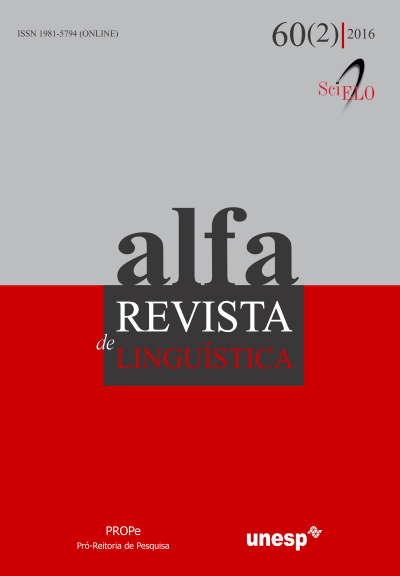Intensifier Adjectives in Brazilian Portuguese: Properties, Distribution, and Morphological Reflexes
DOI:
https://doi.org/10.1590/1981-5794-1608-4Keywords:
Nominal phrase, Modification, Intensifier adjectives,Abstract
In this article we analyze the morphosyntactic, syntactic, and semantic properties of intensifier adjectives in Brazilian Portuguese. To map their distribution, we have applied tests of word order, definiteness, and types of phrases and sentences in which they occur. As a result, we found the following main patterns: (i) they are used exclusively preposed to the modified element, (ii) they appear in definite and indefinite noun phrases, (iii) they can be used in exclamative sentences, and (iv) they can occur in noun phrases with multiple instantiation of indefinite determiners. Regarding the lexical categories they modify, we observed two major groups: those which modify only nouns (viz., baita ‘≈ great’, bruta ‘brute’, senhor(a) ‘sir, lady’, puta ‘whore’), and those which modify nouns and items of other lexical categories (viz., mega ‘mega’, hiper ‘hyper’, super ‘super’). The aforementioned properties shed light on the controversial morphological status of mega, hiper, and super. Although these modifiers are assumed to be prefixes, we claim they are independent adjectives. This assumption allows us to readily explain data such as supermercado ‘supermarket’, mega-feirão ‘big sale’, and hipercorreção ‘hypercorrection’, analyzing them as A-N compounds, oppositely to what the literature has been claiming.Downloads
Download data is not yet available.
Downloads
Published
25/08/2016
How to Cite
FOLTRAN, M. J.; NÓBREGA, V. A. Intensifier Adjectives in Brazilian Portuguese: Properties, Distribution, and Morphological Reflexes. ALFA: Revista de Linguística, São Paulo, v. 60, n. 2, 2016. DOI: 10.1590/1981-5794-1608-4. Disponível em: https://periodicos.fclar.unesp.br/alfa/article/view/7868. Acesso em: 8 feb. 2026.
Issue
Section
Papers
License
Manuscripts accepted for publication and published are property of Alfa: Revista de Linguística. It is forbidden the full or partial submission of the manuscript to any other journal. Authors are solely responsible for the article's content. Translation into another language without written permission from the Editor advised by the Editorial Board is prohibited.

